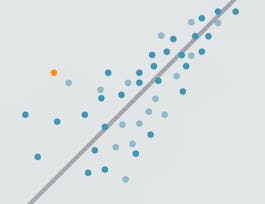This course introduces you to sampling and exploring data, as well as basic probability theory and Bayes' rule. You will examine various types of sampling methods, and discuss how such methods can impact the scope of inference. A variety of exploratory data analysis techniques will be covered, including numeric summary statistics and basic data visualization. You will be guided through installing and using R and RStudio (free statistical software), and will use this software for lab exercises and a final project. The concepts and techniques in this course will serve as building blocks for the inference and modeling courses in the Specialization.


Introduction to Probability and Data with R
This course is part of Data Analysis with R Specialization
Taught in English
Some content may not be translated

Instructor: Mine Çetinkaya-Rundel
280,442 already enrolled
Included with 
Course
(5,570 reviews)
94%
Skills you'll gain
Details to know

Add to your LinkedIn profile
11 quizzes
Course
(5,570 reviews)
94%
See how employees at top companies are mastering in-demand skills

Build your subject-matter expertise
- Learn new concepts from industry experts
- Gain a foundational understanding of a subject or tool
- Develop job-relevant skills with hands-on projects
- Earn a shareable career certificate


Earn a career certificate
Add this credential to your LinkedIn profile, resume, or CV
Share it on social media and in your performance review

There are 8 modules in this course
This course introduces you to sampling and exploring data, as well as basic probability theory. You will examine various types of sampling methods and discuss how such methods can impact the utility of a data analysis. The concepts in this module will serve as building blocks for our later courses.Each lesson comes with a set of learning objectives that will be covered in a series of short videos. Supplementary readings and practice problems will also be suggested from OpenIntro Statistics, 3rd Edition, https://leanpub.com/openintro-statistics/, (a free online introductory statistics textbook, that I co-authored). There will be weekly quizzes designed to assess your learning and mastery of the material covered that week in the videos. In addition, each week will also feature a lab assignment, in which you will use R to apply what you are learning to real data. There will also be a data analysis project designed to enable you to answer research questions of your own choosing. Since this is a Coursera course, you are welcome to participate as much or as little as you’d like, though I hope that you will begin by participating fully. One of the most rewarding aspects of a Coursera course is participation in forum discussions about the course materials. Please take advantage of other students' feedback and insight and contribute your own perspective where you see fit to do so. You can also check out the resource page (https://www.coursera.org/learn/probability-intro/resources/crMc4) listing useful resources for this course. Thank you for joining the Introduction to Probability and Data community! Say hello in the Discussion Forums. We are looking forward to your participation in the course.
What's included
1 video1 reading
Welcome to Introduction to Probability and Data! I hope you are just as excited about this course as I am! In the next five weeks, we will learn about designing studies, explore data via numerical summaries and visualizations, and learn about rules of probability and commonly used probability distributions. If you have any questions, feel free to post them on this module's forum (https://www.coursera.org/learn/probability-intro/module/rQ9Al/discussions?sort=lastActivityAtDesc&page=1) and discuss with your peers! To get started, view the learning objectives (https://www.coursera.org/learn/probability-intro/supplement/rooeY/lesson-learning-objectives) of Lesson 1 in this module.
What's included
6 videos2 readings2 quizzes
To complete this assignment you will use R and RStudio installed on your local computer or through RStudio Cloud.
What's included
2 readings1 quiz
Welcome to Week 2 of Introduction to Probability and Data! Hope you enjoyed materials from Week 1. This week we will delve into numerical and categorical data in more depth, and introduce inference.
What's included
7 videos3 readings2 quizzes
To complete this assignment you will use R and RStudio installed on your local computer or through RStudio Cloud.
What's included
2 readings1 quiz
Welcome to Week 3 of Introduction to Probability and Data! Last week we explored numerical and categorical data. This week we will discuss probability, conditional probability, the Bayes’ theorem, and provide a light introduction to Bayesian inference. Thank you for your enthusiasm and participation, and have a great week! I’m looking forward to working with you on the rest of this course.
What's included
9 videos3 readings2 quizzes
To complete this assignment you will use R and RStudio installed on your local computer or through RStudio Cloud.
What's included
2 readings1 quiz
Great work so far! Welcome to Week 4 -- the last content week of Introduction to Probability and Data! This week we will introduce two probability distributions: the normal and the binomial distributions in particular. As usual, you can evaluate your knowledge in this week's quiz. There will be no labs for this week. Please don't hesitate to post any questions, discussions and related topics on this week's forum (https://www.coursera.org/learn/probability-intro/module/VdVNg/discussions?sort=lastActivityAtDesc&page=1). Also this week, you will be asked to complete an initial data analysis project with a real-world data set. The project is designed to help you discover and explore research questions of your own, using real data and statistical methods we learn in this class. Please read the project instructions to complete this self-assessment.
What's included
6 videos4 readings2 quizzes
Instructor

Offered by
Recommended if you're interested in Data Analysis

Duke University

Duke University

Coursera Project Network

Duke University
Why people choose Coursera for their career




Learner reviews
Showing 3 of 5570
5,570 reviews
- 5 stars
78.32%
- 4 stars
17.33%
- 3 stars
2.41%
- 2 stars
0.64%
- 1 star
1.27%
New to Data Analysis? Start here.

Open new doors with Coursera Plus
Unlimited access to 7,000+ world-class courses, hands-on projects, and job-ready certificate programs - all included in your subscription
Advance your career with an online degree
Earn a degree from world-class universities - 100% online
Join over 3,400 global companies that choose Coursera for Business
Upskill your employees to excel in the digital economy
Frequently asked questions
No. Completion of a Coursera course does not earn you academic credit from Duke; therefore, Duke is not able to provide you with a university transcript. However, your electronic Certificate will be added to your Accomplishments page - from there, you can print your Certificate or add it to your LinkedIn profile.
Access to lectures and assignments depends on your type of enrollment. If you take a course in audit mode, you will be able to see most course materials for free. To access graded assignments and to earn a Certificate, you will need to purchase the Certificate experience, during or after your audit. If you don't see the audit option:
The course may not offer an audit option. You can try a Free Trial instead, or apply for Financial Aid.
The course may offer 'Full Course, No Certificate' instead. This option lets you see all course materials, submit required assessments, and get a final grade. This also means that you will not be able to purchase a Certificate experience.
When you enroll in the course, you get access to all of the courses in the Specialization, and you earn a certificate when you complete the work. Your electronic Certificate will be added to your Accomplishments page - from there, you can print your Certificate or add it to your LinkedIn profile. If you only want to read and view the course content, you can audit the course for free.

